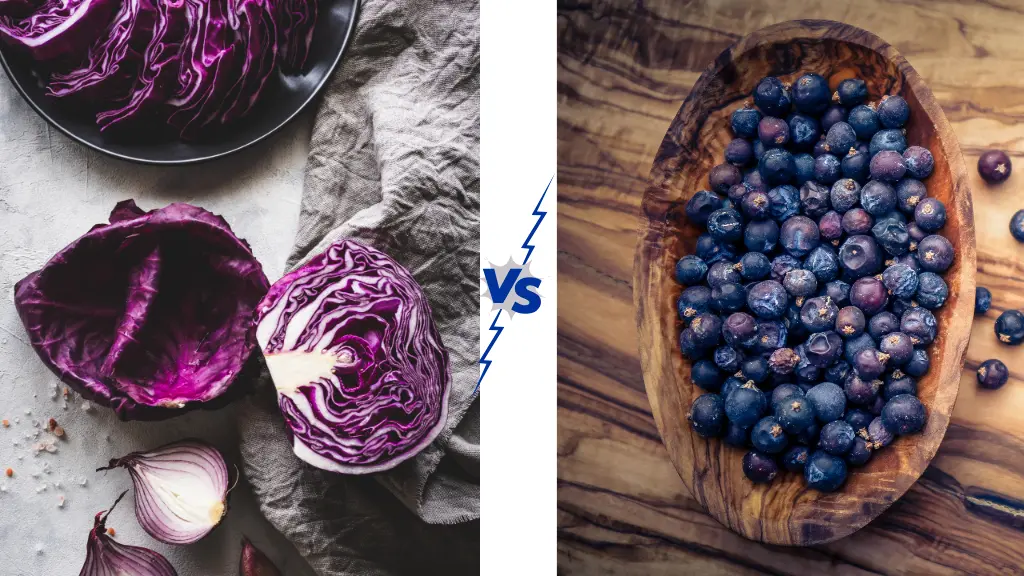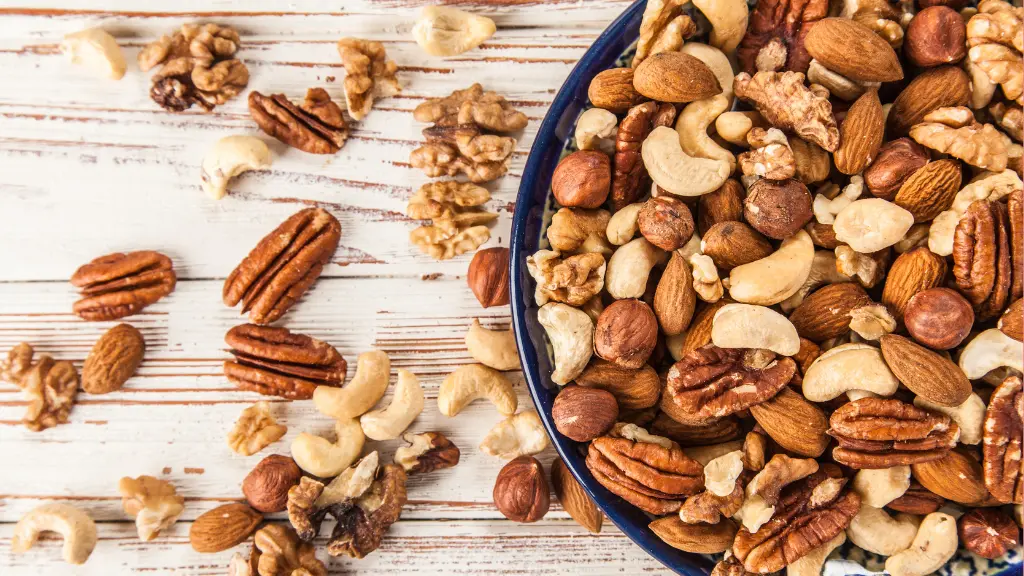Both red cabbage and blueberries are considered nutritional powerhouses. Packed with essential vitamins, antioxidants, and other health-boosting compounds, they are staples in healthy diets. But when it comes to deciding which is healthier, it can be hard to pick a clear winner.
Let’s dive into their nutritional profiles, benefits, and uses to understand how these foods stack up and which might be better for you.
You May Also Like: Why Do Allergies Cause ‘Brain Fog’?
Nutritional Profiles: Red Cabbage vs. Blueberries
Red Cabbage Nutrition
Red cabbage, a cruciferous vegetable, is not only vibrant but also packed with essential nutrients. One cup of raw red cabbage (about 89 grams) contains:
- Calories: 28
- Fiber: 2 grams
- Vitamin C: 56% of the daily recommended intake (DRI)
- Vitamin K: 28% of the DRI
- Potassium: 7% of the DRI
- Antioxidants: Rich in anthocyanins and polyphenols
Red cabbage is low in calories but high in nutrients, making it an excellent addition to a balanced diet.
Blueberries Nutrition
Blueberries are one of the most popular berries, celebrated for their sweetness and health benefits. A one-cup serving (148 grams) contains:
- Calories: 84
- Fiber: 3.6 grams
- Vitamin C: 24% of the DRI
- Vitamin K: 36% of the DRI
- Manganese: 25% of the DRI
- Antioxidants: High levels of anthocyanins
Blueberries are slightly higher in calories than red cabbage, but they offer a natural sweetness and an array of health benefits.
Antioxidants: A Shared Superpower
Both red cabbage and blueberries are celebrated for their high antioxidant content. Antioxidants help combat oxidative stress, reduce inflammation, and protect your cells from damage.
Red Cabbage’s Antioxidants
Red cabbage owes its vibrant hue to anthocyanins, the same compounds found in blueberries. These antioxidants have been linked to:
- Reduced inflammation
- Improved heart health
- Better cognitive function
- Lower cancer risk
Red cabbage is also a rich source of polyphenols and sulforaphane, which further boost its health benefits.
Blueberries’ Antioxidants
Blueberries are often called a “superfood” due to their antioxidant power. They are rich in anthocyanins, flavonoids, and vitamin C, which contribute to:
- Improved memory and brain function
- Enhanced heart health
- Support for healthy skin
- Stronger immune system
When it comes to antioxidants, both foods are exceptional. Blueberries have a slight edge in antioxidant concentration, but red cabbage offers a broader variety of protective compounds.
Key Health Benefits
Red Cabbage Health Benefits
- Heart Health: The anthocyanins in red cabbage support cardiovascular health by improving blood pressure and reducing LDL cholesterol levels.
- Bone Strength: Rich in vitamin K, red cabbage helps strengthen bones and prevent osteoporosis.
- Digestive Health: Its high fiber content promotes gut health and regular digestion.
- Cancer Prevention: Compounds like sulforaphane are known for their potential to reduce the risk of cancer.
Blueberries Health Benefits
- Brain Function: Blueberries are often called “brain berries” because they improve memory and cognitive function, especially in older adults.
- Heart Health: Their antioxidants help lower blood pressure and reduce the risk of heart disease.
- Diabetes Management: Blueberries have a low glycemic index, making them a good choice for maintaining healthy blood sugar levels.
- Skin Health: Vitamin C in blueberries supports collagen production, keeping skin youthful and firm.
Versatility in the Kitchen
Red Cabbage Uses
Red cabbage is incredibly versatile. You can enjoy it raw, cooked, or fermented. Some popular ways to include red cabbage in your diet include:
- Salads: Add shredded red cabbage for a crunchy texture and vibrant color.
- Stir-Fries: Sauté it with other vegetables for a healthy side dish.
- Slaws: Combine it with carrots and a tangy dressing for a refreshing coleslaw.
- Fermented: Turn it into sauerkraut or kimchi for added probiotics.
Blueberries Uses
Blueberries are naturally sweet and make a great snack or ingredient in a variety of dishes:
- Smoothies: Blend blueberries with yogurt or milk for a nutrient-packed drink.
- Oatmeal Toppings: Sprinkle fresh or frozen blueberries on your morning oats.
- Desserts: Use them in pies, muffins, or as a topping for yogurt or ice cream.
- Salads: Add them to green salads for a burst of sweetness.
Red Cabbage vs. Blueberries: Which Is Better for You?
The answer depends on your health goals and dietary preferences.
- For overall health and versatility, red cabbage is a winner. It’s low in calories, rich in vitamins, and highly versatile. Its fiber content also supports gut health.
- For a quick energy boost and brain support, blueberries shine. They provide natural sugars and antioxidants that improve mental clarity and fight fatigue.
In an ideal diet, both red cabbage and blueberries have a place. They complement each other nutritionally and can help you achieve balanced health.
Tips for Adding Both to Your Diet
- Combine Them: Use both in a colorful salad for a nutrient-packed meal. For example, mix shredded red cabbage with fresh blueberries, spinach, and a light vinaigrette.
- Rotate Them: Alternate between red cabbage and blueberries as side dishes or snacks to keep your meals interesting.
- Experiment: Try unique recipes like blueberry salsa or red cabbage wraps.
Conclusion
Red cabbage and blueberries are two superfoods worth including in your diet. While they differ in taste, texture, and specific nutrients, both offer exceptional health benefits. Red cabbage is ideal for savory dishes and fiber, while blueberries satisfy sweet cravings and boost brain health.
Incorporating these colorful foods into your meals can enhance your overall health and well-being. So, why choose? Enjoy the best of both worlds and reap the benefits of these nutrient-dense powerhouses.
Key Takeaways:
- Red cabbage is low-calorie and high in fiber, ideal for gut and heart health.
- Blueberries are rich in antioxidants, supporting brain function and skin health.
- Both foods complement a healthy diet and offer unique nutritional benefits.












[…] You May Also Like: Red Cabbage vs. Blueberries: Which Is Healthier for You? […]